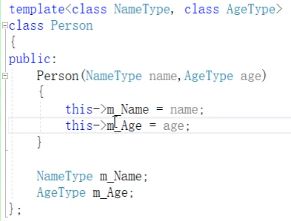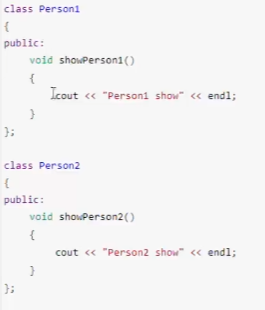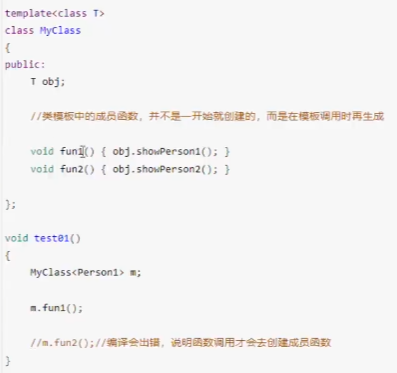大家好,欢迎来到IT知识分享网。
作用:
建立一个通用的类,类中成员数据和数据类型可以不具体定制,用一个虚拟的类型来代表:
语法:
其含义与函数模板的语法相同。。
例子:
实例化代码:
类模板和函数模板的区别
1.类模板没有自动类型推导的使用方式
2.类模板在模板参数列表中可以有默认参数(函数模板不能用!)
①关于第一点的例子:
编译器不会给你自动推导类中的数据类型,只能通过自己手动去指定,如:
②关于第二点的例子:
在声明模板的开头,可以这样编写:
这个的函数的含义是:
class AgeType用户不手动指定类型,则使用已经声明好的int类型
类模板中成员函数创建时机
1.普通类中的成员函数一开始就可以创建
2.类模板中的成员函数在开始调用时才创建
例子:
在编译的时候,编译器不会报错,说明编译过程不会创建这些成员函数(obj.showPerson1和obj.showPerson2)
说明:类模板的成员函数要先调用才会创建。。
类模板对象做函数参数
含义:类模板实例化出的对象,向函数传参的方式
共用三类传入方式:
1.指定传入的类型——直接显示对象的数据类型
2.参数模板化——把对象中的参数变为模板进行传递
3.整个类模板化——把这个对象类型模板化进行传递
1 #include <iostream> 2 #include <string> 3 #include <typeinfo> 4 using namespace std; 5 6 template<class T1, class T2> 7 class Person{ 8 public: 9 Person(T1 name, T2 age){ 10 this->m_Name = name; 11 this->m_Age = age; 12 } 13 14 void showPerson(){ 15 cout << "名字:" << this->m_Name << " 年龄:" << this->m_Age << endl; 16 } 17 18 T1 m_Name; 19 T2 m_Age; 20 }; 21 22 //1.指定传入类型(常用) 23 void printPerson1(Person<string,int> &p){ 24 p.showPerson(); 25 } 26 27 void test01(){ 28 Person<string,int> p ("我",100); 29 printPerson1(p); 30 } 31 32 //2.参数模板化 33 template<class T1, class T2> 34 void printPerson2(Person<T1,T2> &p){ 35 cout << "T1的类型是:" << typeid(T1).name() << endl; 36 cout << "T2的类型是:" << typeid(T2).name() << endl; 37 p.showPerson(); 38 //typeid用来获取一个表达式的类型信息。 39 //对于基本类型(int、float 等C++内置类型)的数据,类型信息所包含的内容比较简单,主要是指数据的类型。 40 //对于类类型的数据(也就是对象),类型信息是指对象所属的类、所包含的成员、所在的继承关系等。 41 } 42 43 void test02(){ 44 Person<string,int> p ("你",10); 45 printPerson2(p); 46 } 47 48 //3.整个类模板化 49 template<class T> 50 void printPerson3(T &p){ 51 p.showPerson(); 52 cout << "T的类型是:" << typeid(T).name() << endl; 53 } 54 55 void test03(){ 56 Person<string,int> p ("他",150); 57 printPerson3(p); 58 } 59 60 int main(){ 61 //test01(); 62 //test02(); 63 test03(); 64 system("pause"); 65 return 0; 66 }
类模板与继承
注意:
1.当子类继承的父类是一个类模板时,子类在声明的时候,要指定出父类中T的类型
2.如果不指定,编译器无法给子类分配内存
3.如果想灵活指定出父类中T的类型,子类也需变为类模板
1 #include <iostream> 2 3 using namespace std; 4 5 template<class T> 6 class Base{ 7 T m; 8 }; 9 10 //class Son: public Base{}; 错误,缺少类模板Base的参数列表,编译器算不出来你这个类要占多大的内存 11 class Son: public Base<int>{ //Base<int>告诉编译器子类继承的是父类的int类型 12 13 }; 14 15 //若要灵活指定父类中T的类型,子类也需要变成类模板 16 template<class T1,class T2> //T1指向下列子类模板的类型,T2指向此子类继承的父类模板的类型 17 class Son2:public Base<T2>{ 18 public: 19 Son2(){ 20 cout << "T1的类型是:" << typeid(T1).name() << endl; 21 cout << "T2的类型是:" << typeid(T2).name() << endl; 22 } 23 T1 obj; 24 }; 25 26 void test(){ 27 Son2<int,char>S; 28 //int传给了T1,说明obj是一个int型,char传给了T2,又由T2传给T,确定了父类类型为char 29 } 30 31 int main(){ 32 test(); 33 system("pause"); 34 return 0; 35 }
类模板成员函数类外实现
例子:
1 #include <iostream> 2 3 using namespace std; 4 5 template<class T1, class T2> 6 class Person{ 7 public: 8 //类内实现 9 // Person(T1 name, T2 age){ 10 // this->mName = name; 11 // this->mAge = age; 12 // } 13 14 // void showPerson(){ 15 // cout << "name:" << this->mName << endl; 16 // cout << "age:" << this->mAge << endl; 17 // } 18 19 //类外实现 20 Person(T1 name, T2 age); 21 void showPerson(); 22 23 T1 mName; 24 T2 mAge; 25 }; 26 27 //构造函数的类外实现 28 template<class T1, class T2> 29 Person<T1,T2>::Person(T1 name, T2 age){ 30 this->mName = name; 31 this->mAge = age; 32 } 33 34 //成员函数的类外实现 35 template<class T1, class T2> 36 void Person<T1,T2>::showPerson(){ 37 cout << "name:" << this->mName << endl; 38 cout << "age:" << this->mAge << endl; 39 } 40 41 void test(){ 42 Person<string, int>S("Tom",20); 43 S.showPerson(); 44 } 45 46 int main(){ 47 test(); 48 system("pause"); 49 return 0; 50 }
类模板分文件编写
问题:由于类模板中成员函数创建的时机是在调用阶段,在分开写文件的时候链接不到(编译报错)
例子:
①Person.H文件
1 #ifndef __Person_H__ 2 #define __Person_H__ 3 4 #endif 5 #include <iostream> 6 using namespace std; 7 8 template<class T1, class T2> 9 class Person{ 10 public: 11 Person(T1 name, T2 age); 12 13 void showPerson(); 14 15 T1 mName; 16 T2 mAge; 17 };
②Person.cpp文件
1 #include "Person.h" 2 3 template<class T1, class T2> 4 Person<T1,T2>::Person(T1 name, T2 age){ 5 this->mName = name; 6 this->mAge = age; 7 } 8 9 template<class T1, class T2> 10 void Person<T1,T2>::showPerson(){ 11 cout << "name:" << this->mName << endl; 12 cout << "age:" << this->mAge << endl; 13 }
③Person.hpp文件
1 #ifndef __Person_HPP__ 2 #define __Person_HPP__ 3 4 #endif 5 #include <iostream> 6 using namespace std; 7 8 template<class T1, class T2> 9 class Person{ 10 public: 11 Person(T1 name, T2 age); 12 13 void showPerson(); 14 15 T1 mName; 16 T2 mAge; 17 }; 18 19 template<class T1, class T2> 20 Person<T1,T2>::Person(T1 name, T2 age){ 21 this->mName = name; 22 this->mAge = age; 23 } 24 25 template<class T1, class T2> 26 void Person<T1,T2>::showPerson(){ 27 cout << "name:" << this->mName << endl; 28 cout << "age:" << this->mAge << endl; 29 }
④(主函数内调用)usePerson.cpp文件
1 #include<iostream> 2 using namespace std; 3 4 //第一种解决方式:直接包含源文件(少用) 5 //#include "Person.hpp" //只用这条,会报错, 6 //#include "Person.cpp" //解决方法1,只用这条,可以运行 7 8 /*类模板中的成员函数是不会一开始就创建的,当只包含include "Person.hpp"时候,编译器只看到了 9 头文件里面写的声明,不会去具体实现生成声明中的两个函数 Person<string,int> P("Tom",23);和P.showPerson(); 10 所以只靠#include "Person.hpp"是链接不到类模板的 11 */ 12 /*但当你使用#include "Person.cpp"时候,编译器会去看你Person.cpp文件的内容,其中也cpp文件内也引用了相应的头文件 13 因此只靠这条是可以顺利运行代码的*/ 14 15 16 //第二种解决方法:把.h和.cpp的内容写一起,组成.hpp文件 17 #include "Person.hpp" 18 19 void test(){ 20 Person<string,int> P("Tom",23); 21 P.showPerson(); 22 } 23 24 int main(){ 25 test(); 26 system("pause"); 27 return 0; 28 }
类模板与友元
1.全局函数类内实现,直接在类内声明友元即可
2.全局函数类外实现,需要提前让编译器知道全局函数的存在(复杂)
例子:
1 #include <iostream> 2 3 using namespace std; 4 5 //2.类外实现 6 template<class T1,class T2> 7 class Person; //提前让编译器知道Person类的存在 8 9 template<class T1,class T2> 10 void printPerson2(Person<T1,T2>p){ 11 cout << "name:" << p.mName << " age:" << p.mAge << endl; 12 } 13 ///// 14 15 template<class T1, class T2> 16 class Person{ 17 //全局函数打印Person信息 18 //全局函数,类内实现 19 // friend void printPerson(Person<T1,T2>p){ 20 // cout << "name:" << p.mName << " age:" << p.mAge << endl; 21 // } 22 23 //全局函数,类外实现 24 // friend void printPerson2(Person<T1,T2>p); //这是普通函数声明,类外实现是模板函数,说明类外的模板函数并没有被声明 25 friend void printPerson2<>(Person<T1,T2>p); //告知编译器这是声明模板函数 26 //同时还要进行一步:把类外实现的函数放到这个类的上方,同时要声明要调用的类 27 28 public: 29 Person(T1 name, T2 age){ 30 this->mAge = age; 31 this->mName = name; 32 } 33 34 private: 35 T1 mName; 36 T2 mAge; 37 }; 38 39 //1.全局函数在类内实现 40 // void test01(){ 41 // Person<string,int>p("Tom",25); 42 // printPerson(p); 43 // } 44 45 46 //全局函数在类内实现 47 void test02(){ 48 Person<string,int>s("woo",20); 49 printPerson2(s); 50 } 51 52 int main(){ 53 //test01(); 54 test02(); 55 system("pause"); 56 return 0; 57 }
免责声明:本站所有文章内容,图片,视频等均是来源于用户投稿和互联网及文摘转载整编而成,不代表本站观点,不承担相关法律责任。其著作权各归其原作者或其出版社所有。如发现本站有涉嫌抄袭侵权/违法违规的内容,侵犯到您的权益,请在线联系站长,一经查实,本站将立刻删除。 本文来自网络,若有侵权,请联系删除,如若转载,请注明出处:https://yundeesoft.com/30886.html









